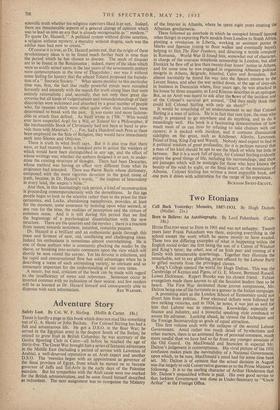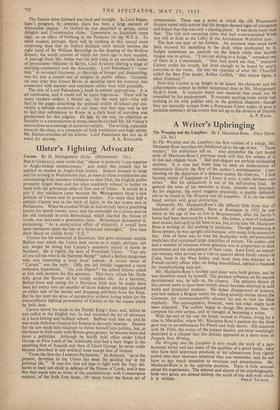Two Etonians
Call Back Yesterday: Memoirs, 1887-1931. By Hugh Dalton. (Muller. 21s.) Born to Believe: An Autobiography. By Lord Pakenham. (Cape. 18s.) HUGH DALTON went to Eton in 1901 and was not unhappy. Twenty years later Frank Pakenham was there, enjoying everything in the school except the work which he seems mostly to have evaded. These two are differing examples of what is happening within the English social order: the first being the son of a Canon of Windsor and King's tutor; the other, son of an Irish peer and coming of a family with innumerable quarterings. Together they illustrate the remarkable, not to say glittering, prizes offered by the Labour Party to gifted recruits from the privileged classes.
King's College opened the world for Hugh Dalton. This was the Cambridge of Keynes and Pigou, of G. E. Moore, Bertrand Russell, Lowe S Dickinson. Rupert Brooke was his closest friend. Fabian evangelism made them known to all the Socialist leaders then to be heard. The First War decimated those joyous companions, Mr. Dalton being one of the fortunate as a gunner in the Italian campaign. 'A promising start at the London School of Economics could not divert him from politics. Four electoral defeats were followed bY two striking victories, and in 1924, he notes, it was just as well for • him that Labour was in opposition. Knowledge, especially of finance and industry, and a powerful speaking style combined to assure his advance. Looking ahead, he viewed the Exchequer and the Foreign Secretaryship as goals of equal attraction.
This first volume ends with the collapse of the second Labour Government. Amid rather too much detail of by-elections and other matters, there is an animated flow of personal comment, much more candid than we have had so far from any younger associate of the Old Guard. On MacDonald and Snowden in especial Mr. Dalton's judgement is contemptuous. His vivid picture of the 1931 confusion makes plain the inevitability of a National Government, upon which, to be sure, MacDonald's mind had for some time been set. Mr. Dalton is of opinion that the actual decision in August was due largely to odd Conservative guesses as to the Prime Minister's following. It is to the sterling character of Arthur Henderson that Mr. Dalton's unqualified tribute is paid. His own good service to that luckless Government was done as Under-Secretary to "Cncle Arthur" at the Foreign Office. The Dalton drive forward was hard and straight. In Lord Paken- ham's progress, by contrast, there has been a large element of favourable chance. At Oxford he was absorbed in games, social delights and Conservative clubs. Conversion to Socialism came later, as an effect of working in the Potteries for the W.E.A. To most readers, perhaps, there will be nothing in this recotd more surprising than that an Oxford political tutor should become the right hand of Sir William Beveridge in the shaping of the Welfare Report, the world renown of which ten years ago is here recalled. A peerage from Mr. Attlee was the first rung in an enviable ladder of promotion—Minister in Berlin, Civil Aviation (during a stage of startling expansion) and the Admiralty. Lord Pakenham's "voca- tion" in occupied Germany, at the crisis of hunger and dismantling, was for him a crucial test of religion in public affairs. Certainly we may infer that Ernest Bevin, in deciding upon his removal, was concerned with manner and sentiment rather than with principle.
The title of Lord Pakenhanfds book is entirely appropriate. It is all confession, and it could not be more ingenuous. There will be many readers—elders, I should say, for the most part—who will find in the pages describing the spiritual aridity of school and uni- versity a tell-tale revelation of our time; and they may well be led to feel that submission to Rome in a dark hour of war-time was predestined for this pilgrim. He has, by the way, no objection as Socialist to a contradiction in terms, since he can hail Mr. De Valera's nationalism as a message of universal validity. The writing, especially towards the close, is a crescendo of Irish confidence and high spirits. Mr. Dalton criticises all his fellows. Lord Pakenham has not an ill



































 Previous page
Previous page